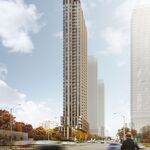Disparishun
Active Member
I wonder what the boundaries of the re-formed town would be. On the west side, it's quite easy - the CN/GO Newmarket Sub, on the east side, a bit more up-in-the air, but 404 would be perfect, CN Bala Sub I guess reasonable. The 407 would obviously be the northern border.
There's a map for the Thornhill political riding here. East-west, it's the 400 to the 404, so it basically subsumes Concord. West of Bathurst to the 400, the northern boundary is Rutherford, which seems odd historically, but now makes sense in light of Vaughan's and developers' (are the two any different?) efforts to push Thornhill northward: Thornhill Woods, the Thornhill North Community Centre, and so forth.
Without Thornhill, Vaughan and Markham would still have all sorts of developable land.
That's for sure!




